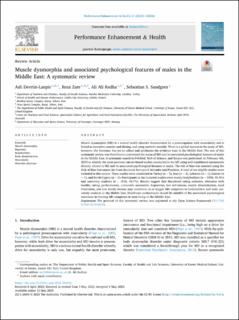| dc.contributor.author | Devrim-Lanpir, Asli | |
| dc.contributor.author | Zare, Reza | |
| dc.contributor.author | Redha, Ali Ali | |
| dc.contributor.author | Sandgren, Sebastian S | |
| dc.date.accessioned | 2024-02-06T14:16:48Z | |
| dc.date.available | 2024-02-06T14:16:48Z | |
| dc.date.created | 2023-05-13T10:10:04Z | |
| dc.date.issued | 2023 | |
| dc.identifier.citation | Devrim-Lanpir, A., Zare, R., Redha, A.A., Sandgren, S.S. (2023) Muscle dysmorphia and associated psychological features of males in the Middle East: A systematic review. Performance Enhancement & Health, 11(3), 100256 | en_US |
| dc.identifier.issn | 2211-2669 | |
| dc.identifier.uri | https://hdl.handle.net/11250/3115997 | |
| dc.description.abstract | Muscle dysmorphia (MD) is a mental health disorder characterized by a preoccupation with muscularity and is linked to excessive exercise and dieting, and using anabolic steroids. There is a global interest in the study of MD, however, the literature has yet to collect and synthesize the evidence base in the Middle East. The aim of this systematic review was therefore to understand the status of MD and its associated psychological features of males in the Middle East. A systematic search in PubMed, Web of Science, and Scopus was performed on February 4th, 2023 to identify the cross-sectional survey-based studies conducted in the ME using well-established assessments directly related to MD and its associated psychological features in males. The risk of bias was assessed using the Risk of Bias Instrument for Cross-Sectional Surveys of Attitudes and Practices. A total of ten eligible studies were included in this review. These studies were conducted in Turkey (n = 5), Iran (n = 2), Lebanon (n = 1), Kuwait (n = 1), and North Cyprus (n = 1). Participants in the included studies were mainly bodybuilders (n = 1958, 55.4%) and university students (n = 1510, 42.7%). Results suggest that disordered eating attitudes, obsession with healthy eating, perfectionism, vulnerable narcissistic disposition, low self-esteem, muscle dissatisfaction, need frustration, and low family income may contribute to or trigger MD symptoms in bodybuilders and male university students in the Middle East. Healthcare professionals should be mindful of the associated psychological correlates in treating MD symptoms in men living in the Middle East. | en_US |
| dc.language.iso | eng | en_US |
| dc.publisher | Elsevier Ltd. | en_US |
| dc.rights | Navngivelse 4.0 Internasjonal | * |
| dc.rights.uri | http://creativecommons.org/licenses/by/4.0/deed.no | * |
| dc.subject | psykiatri | en_US |
| dc.subject | muskeldysmorfi | en_US |
| dc.subject | megareksi | en_US |
| dc.title | Muscle dysmorphia and associated psychological features of males in the Middle East: A systematic review | en_US |
| dc.type | Peer reviewed | en_US |
| dc.type | Journal article | en_US |
| dc.description.version | publishedVersion | en_US |
| dc.rights.holder | © 2023 The Author(s). | en_US |
| dc.subject.nsi | VDP::Medisinske Fag: 700::Klinisk medisinske fag: 750::Psykiatri, barnepsykiatri: 757 | en_US |
| dc.source.volume | 11 | en_US |
| dc.source.journal | Performance Enhancement & Health | en_US |
| dc.source.issue | 3 | en_US |
| dc.identifier.doi | 10.1016/j.peh.2023.100256 | |
| dc.identifier.cristin | 2147276 | |
| dc.source.articlenumber | 100256 | en_US |
| cristin.ispublished | true | |
| cristin.fulltext | original | |
| cristin.fulltext | original | |
| cristin.qualitycode | 1 | |

